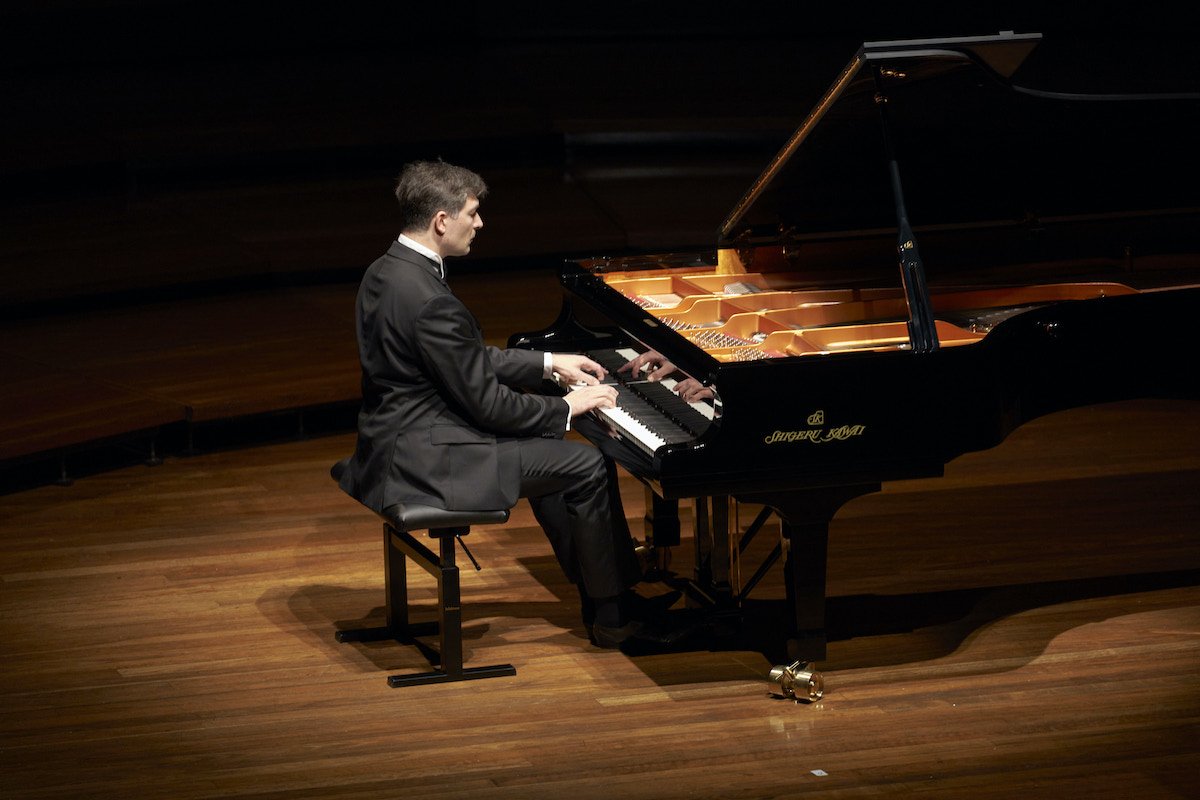2023 Sydney International Piano Competition (photograph by Jay Patel).
At last, ‘The Sydney’ is back. Not since 2016 has the city given a live welcome to one of its most distinctive artistic events: the Sydney International Piano Competition. After frustrating years of virtual activity, planning insecurity, and structural rethinking, Piano-Plus (Piano+) has emerged as the umbrella body for presenting a wide range of competition, festival, touring, and educational activities. As its chair, Virginia Braden, said at Wednesday’s Opening Gala, under these new auspices there will be musical opportunities ‘for everyone, young and old’. But the Competition remains its central feature.
Over the coming fortnight, thirty-two contestants will pass through solo, chamber-music, and concerto tests in pursuit of two dozen well-endowed prizes worth nearly a quarter of a million dollars. All have a particular hope: to carry off the Ernest Hutcheson First Prize, or, perhaps, to win over audiences’ ears and thereby gain the Rex Hobcroft People’s Choice award.
The Gala, however, was not about this year’s competitors. It placed the jurors on stage, as they publicly strutted their pianistic credentials before taking the veil of silence expected of any impartial judge. The evening also gave them the chance to test out some of the instruments, acoustics, and (not to forget) audiences that the competitors will be confronting in the coming weeks.
Alexander Gavrylyuk performing at the Sydney International Piano Competition (photograph by Jay Patel).
Now, pianists have a particular challenge that competitions only sharpen. Unlike at flute or violin competitions, piano contestants are not allowed to bring their own instrument. So which make or model will they be allowed to, or want to, play from among the Competition’s three approved providers: Steinway, Kawai, or Fazioli? After much thought, a rigorous system has been developed so that competitors will need to perform, at some stage of the Competition, on each providers’ instruments. But what about the jurors in their own Gala performances?
Well, the pianos were in direct competition at Wednesday’s Gala, with piano switches occurring between nearly all items. The evening began with Kawai’s Shigeru, ended with a Fazioli, and more daringly paired the magnificent Fazioli with a Steinway in the evening’s only two-piano work. To my hearing, it was more a Fazioli and Kawai night than a Steinway. But I am sure audience members, as well as the piano firms, will be carefully mapping the complex matrix of repertory, piano make, competitor, and different hall acoustics.
This rather long Gala gave the seven jurors the chance to craft a truly varied program, eshewing the more trivial processions of over-practised encores that often dominate a festival’s gala night. Over its couple of hours we really could glimpse the very different musical personalities behind the steely technique or confident interpretations.
Several of the jurors played pieces with which they have a personal connection. These items provided the more introspective corners of the evening, because of the pianist’s unique insights. Xiaohan Wang exquisitely performed two of his own Impromptus, inspired by two leading Chinese visual artists of the seventeenth century. Uta Weyand played a delightful neo-romantic Sonatine pour Yvette (1962) by one of her own mentors, the Spanish-Catalan composer Xavier Montsalvatge. And Tanya Bannister chose as her item Leoš Janáček’s four-movement In the Mists (1912), which, as her website shows, has perhaps become her signature work.
This same depth of personal insight emerged clearly, but just a little less cleanly, in the performance of the Romance and Tarantella movements of Rachmaninoff’s Op. 17 two-piano Suite by Competition artistic director Piers Lane and Kathryn Stott. This Suite closely resonates with his Op. 18, the famous Second Piano Concerto. (The First Concerto is one of the Competition’s set pieces.)
Then there were the more avowedly iconoclastic performances, placed strategically at the main crossroads of the Gala’s programme. It is a telling statement of our times that these cornerstone works were performed by two pianists born in the Soviet Union (Alexander Gavrylyuk in Ukraine; Konstantin Shamray in Russia), but now both living in Australia.
Gavrylyuk was the evening’s final actor, presenting Rachmaninoff’s ever-popular Vocalise, in a sparkling arrangement by the late Zoltán Kocsis but in a somewhat more mellow mood than Kocsis himself played it. The following Tarantella, from Liszt’s Venezia e Napoli, was powerfully presented, never pulling back from the devilish – even rough and relentless –texture, that in its day made people wonder how many fingers or hands Liszt actually did have. It was a rousing culmination to the evening, and the audience loved it.
At the other end of the evening, Shamray had opened proceedings with two short Rameau pieces, demonstrating his superb filigree fingering, before launching into the Gala’s most intense demonstration of keyboard musicianship, Scriabin’s Seventh Piano Sonata, the ‘White Mass’, at which even Scriabin specialists sometimes blanch. Its single movement calls for not just a consummate level of pianistic technique but also a consistent intuiting of the mystical meanings within Scriabin’s craggy sonata. Under Shamray’s strong fingers and subtle pedalling, the Shigeru Kawai rose magnificently to the occasion.
Shamray’s lighter musicianship was called upon in the five-minute ‘encore piece’, Castelnuovo-Tedesco’s Figaro Concert Rhapsodie (after Rossini), which signalled the end of the Gala’s first half. Presented alongside Sydney violinist Andrew Haveron, it was very much an equal duo, rather than, as sometimes, a piece for violin with piano accompaniment.
This is the same Shamray who fifteen years ago won the Sydney Competition, and, uniquely among Competition winners, also gained the People’s Choice award. Yes, competitions such as ‘The Sydney’ do help to make the careers of the maestros of the future, though do spare a thought for those whose aspirations are not affirmed by such gruelling contests.
The 2023 Sydney International Piano Competition Opening Gala took place at the Sydney Conservatorium on 5 July 2023.

